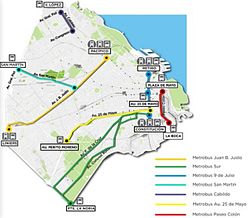Metrobus (Buenos Aires)
 |
|||
| Overview | |||
|---|---|---|---|
| Owner | City of Buenos Aires | ||
| Locale | Buenos Aires | ||
| Transit type | Bus Rapid Transit | ||
| Number of lines | 5 | ||
| Number of stations | 113 (not including 25 de Mayo line) | ||
| Daily ridership | 1 million (2015) | ||
| Website | Official website | ||
| Operation | |||
| Began operation | 31 May 2011 | ||
| Technical | |||
| System length | 50.5 km (31.4 mi) | ||
|
|||
 Map showing current lines and lines under construction.
Map showing current lines and lines under construction.
The Buenos Aires Metrobus is a 50.5 km (31.4 mi) network of dedicated separated lanes and stations for normal buses that serve the city of Buenos Aires, Argentina. Designed as a Bus Rapid Transit system, it mixes a few bi-articulated buses with conventional buses. The headway is the same as before the implementation of the system, and it lacks the brand of the network in the buses that use it, maintaining their previous branding as common bus lines with their own numbers. The service operates 24 hours a day and 365 days a year, with 2-4 minute frequencies during the day and 10-15 minutes at night.
The first segment of the network opened to the public in May 2011, and runs through the entirety of Juan B. Justo Avenue linking the neighbourhoods of Liniers and Palermo. This segment consists of 21 stations and has a distance of 12 kilometres (7.5 mi).
The second segment of the network, opened on 24 July 2013, spans the length of the 9 de Julio Avenue, consisting of 17 stations running for 3 kilometres (1.9 mi).
The third segment of the network opened on 14 August 2013, and consists of 36 stops with a distance of 23 kilometres (14 mi). This segment runs through important arteries of the southern area of the city, bringing commuters back and forth from the southern (Constitución) rail terminal of the General Roca Railway to the city proper's borders (General Paz Avenue). In parts of this segment of the network (along Rabanal Avenue) the bus lines merge with the general traffic and return to the dedicated lane afterwards.
...
Wikipedia
